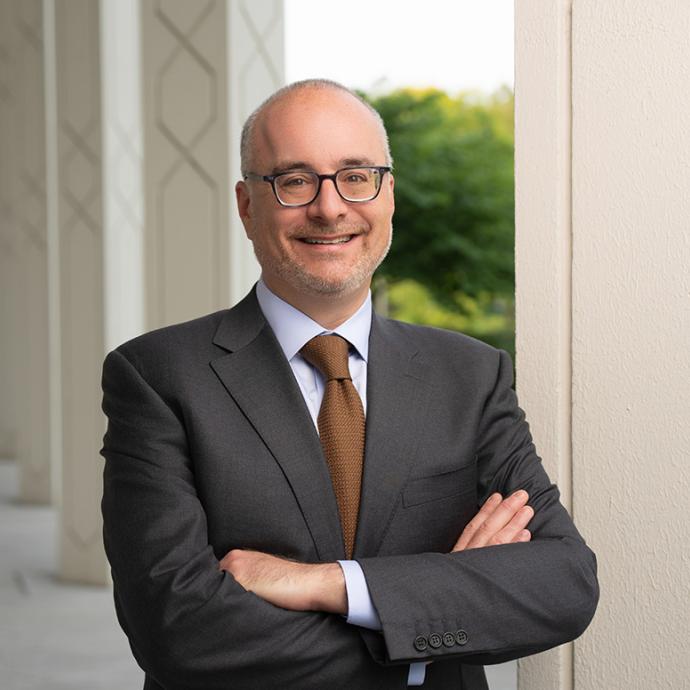When David Miller’s mother suggested that he apply for a Fire Scholarship at the University of Chicago about 15 years ago, he initially balked. He had planned instead to study mechanical engineering at a state university with support from a Chick Evans Caddie Scholarship.
But as the son of then-active Chicago firefighters, he qualified for the scholarship. His mother, Elsbeth Thrailkill Miller, retired in 2012 as field chief of Chicago Fire Department District 2. His father, Dennis R. Miller, retired in 2003 as captain of Chicago Fire Department Engine Company 55. David Miller applied for and received a full scholarship to attend UChicago and enrolled at the University in 2001. That started Miller, AB’05, on a path that resulted in his appointment as the Neubauer Family Assistant Professor in Physics in 2013.
“My parents were always very encouraging about exploring and being creative,” said Miller, who grew up building things in the family’s basement workshop. That experience helped prepare him for the critical electronics work that he and his research group perform for the world’s most powerful particle accelerator, the Large Hadron Collider at CERN in Geneva, Switzerland.
UChicago’s Police and Fire Scholarships have helped transform students’ lives for decades. The full-tuition scholarships are available to children of active Chicago firefighters and police officers; students with a parent who died in the line of duty also are eligible. The program honors the service of Chicago firefighters and police officers to the University community and the city of Chicago. Firefighting has been a proud tradition in Miller’s family, including service by Miller’s brother, Jerry, and his mother’s late partner, John Leonard.
Fun searcher
After graduating from UChicago with honors, Miller spent a year working as a research technician at CERN, the European Organization for Nuclear Research. When he talks to undergraduates now, they often ask if he always knew that he wanted to become a high-energy particle physicist. In fact, Miller did not set out to go into that subfield; rather, he thought that his path would lead him into particle astrophysics.
“I wanted to do the most fun thing. Every chance I had, I tried to do that. Here I am, and it’s a lot of fun,” Miller said.
Miller’s UChicago scholarship was the crucial first step in opening up those possibilities, he said. “Having the Chicago Fire Department Scholarship allowed me take advantage of the huge opportunities and encouragement that the University of Chicago has in terms of research for undergraduate students to really understand that fundamental research is what I wanted to pursue for a career,” Miller said.
His year at the LHC was well-timed. “I realized that this was an amazing operation where some of the most important physics was going on,” he said. Miller helped build the LHC’s ATLAS detector. He helped install the detector’s first power supplies and powered it up. Miller compared the experience to turning on the lights of a Christmas tree for the first time in the holiday season. “It was pretty impressive.”
Following his year at CERN, Miller entered graduate school at Stanford University, completing his doctorate in 2011. Then he returned to UChicago as a McCormick Fellow in the Enrico Fermi Institute. In 2015, he received a National Science Foundation CAREER Award, which provides a million dollars in support over five years.
The CAREER Award supports Miller’s ongoing research program using the ATLAS detector at the LHC to answer questions about the fundamental structure of matter at the collider’s new energy frontier. He specializes in measuring the properties of jets of fundamental particles.
These jets are the visible experimental manifestation of quarks and gluons, which are some of the most fundamental particles known to science. Gluons carry the strong nuclear force that binds fundamental particles of matter to form larger particles.
“And quarks are the constituents of you and me and everything around us. They’re what’s inside a proton and a neutron, which make up the nuclei of everything,” Miller explained.
Picky research
With the detectors and high-precision electronics that Miller and his UChicago associates have built, “We can now pick apart those sprays of particles to a much higher degree than was ever before possible,” he said. “It turns out that there’s an enormous amount of information in there.”
And sometimes the jets overlap each other. “Devising clever ways and clever hardware to make it easier to unravel that is an important aspect of the long-term progress of physics at the LHC,” said Mark Oreglia, professor in physics.
“David Miller has been quite active in this business of jet reconstruction and developed some early, successful ways of dealing with these so-called merged jets. In other words, developing an algorithm that can tell you that what looks like one jet is really two and can give you a crude measurement of the energies of the two of them. He has a lot of energy and a lot of good ideas.”
Miller is applying that energy and those ideas to investigate major scientific questions pertaining to dark matter, supersymmetry and the Higgs boson.










 —Prof. Kunle Odunsi
—Prof. Kunle Odunsi
